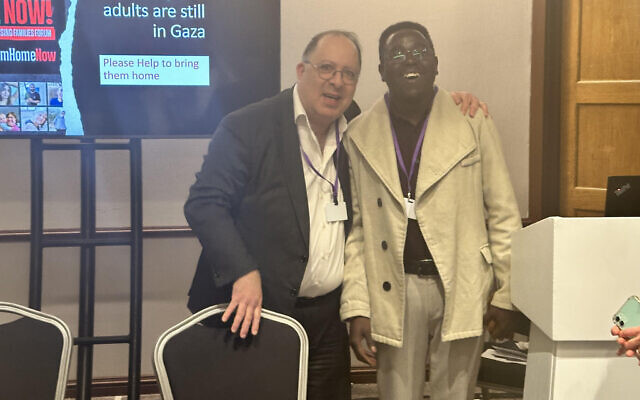‘I get daily calls from refugees in Israel wanting to fight for the IDF against Hamas’
Monim Haroon, who fled genocide in Darfur to live in Israel, tells Limmud 2023 about the refugee community's empathy with fight against Hamas
Lee Harpin is the Jewish News's political editor
An asylum seeker who fled the genocide in Darfur to live in Israel has told how he is receiving daily calls since the 7 October Hamas atrocity from migrants wanting to join the army and fight for the Jewish state.
Speaking at two sessions at Limmud 2023, Monim Haroon, 33, told of his perilous but remarkable escape from almost certain persecution in his family’s village on Darfur’s Jebel Marrah mountain, into Egypt and eventually a six-hour walk across the Sinai into Israel.
Brought over to this week’s Limmud Festival in Birmingham by the international relief organization HIAS/JCORE, led in this country by Rabbi David Mason, Haroon’s talks were intended to raise renewed awareness of the genocide in Darfur.
A two-decade long conflict in Western Sudan became known as the first genocide of the 21st century leaving an estimated 500,000 killed and millions displaced.
It still continues today, but has slipped almost completely from the news agenda in the wake of more recent conflicts.
Haroon, who now works as an advocacy manager for HIAS Israel helping support refugees in the country, said successive Israeli governments had enacted harsh policies towards illegal migrants arriving from African states, including Ethiopia, Eritrea and Sudan.
His own claim for asylum in Israel remaining unanswered a decade after it was first submitted.
But while life in Israel for around 22,000 refugees is not easy, Haroon revealed how the community’s response to the horrendous Hamas terror attack of October 7th had offered “light” in what was an “unprecedented and dark moment” in the history of the Jewish state.
He reminded the Limmud audience how amongst the 1200 people murdered by Hamas were two refugees – one who was Sudanese, another who was Eritrean.
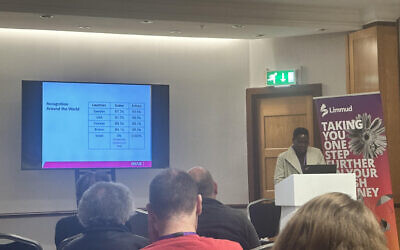
In the aftermath of the horrendous atrocity, Haroon said:”It was beautiful to see the empathy, the solidarity, the joint feelings that everyone has, including the refugees, along with the rest of Israeli society.
“Everyone felt heavily impacted by the attack. The refugees have been in Israel for 15 years now. 15 years without leaving Israel for a single day, because they don’t have travel documents.
“Israel has been their home for 15 years continuously, working, and building friendships with the wider society, with colleagues at work. This connection was really clear and present after October 7.
“Refugees started doing exactly the same as other Israeli people were doing. They were showing support with the victims, with the familes of the kidnapped, going to the farms to collect food for those who had been displaced, and going to rallies supporting the calls to ‘Bring Them Home.'”
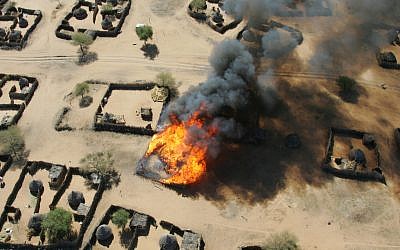
There was one further dramatic development, Haroon revealed.
“After October 7th I was getting calls everyday from within the refugee community begging me to find ways for them to join the Israeli army.
“I found that fascinating. There was a sense we were being attacked not only by Hamas, but also by Hezbollah.
“One might think if you are not a citizen of this country, you might want to find ways to leave to a safer place abroad. But no, the reaction was ‘I want to join the army’ ‘I want to help my people’.
“That is the sentiment the refugees have for Israel. Another reason is that refugees feel grateful for being in Israel, because the comparison is where they came from.”
Haroon’s journey into Israel is also remarkable. The Janjaweed, a Sudanese government backed militia, had set their sights on butchering the men and boys in the Darfur village he had grown up in. Born a Muslim, the hardline Islamist regime did not approve of the liberal version of the religion practiced in the region.
First Haroon’s family sent him away for his own safety to finish school in southeast Sudan, where he began a five-year course in electrical engineering at Blue Nile University.But after his brother and friends were arrested, after campaigning against hardline Islamism and in favour of democracy, Haroon crossed into Egypt for a while.
But as relations between the government there, and the Sudanese regime grew ever closer, he again feared for his safety.
In late 2012, he made the six hour journey on foot across the Sinai into Israel, seeking the help of Bedouin smugglers.
“Unfortunately, we had walked about five hours to get into the fence we had been shown, and before we crossed there was a wave of shootings, ” Haroon later told Jewish News.
“I was with a group of Eritraens. The shootings were from Egyptian patrol at the border trying to prevent us crossing the border. Unfortunately the shootings killed two of the people I had been walking together with.”
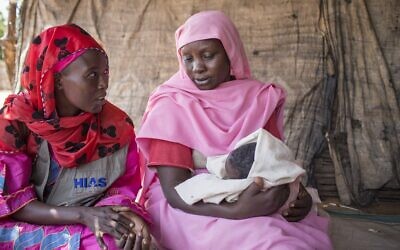
Haroon recalls running across the border with a group of people into Israel in the desert.
“It was really hard, I was hungry, drinking only water, eating only a bit of bread,” he says.
Then came another surprise for Haroon, who had previously only been taught only bad things about both Israel and the Jewish state ever since attending school in Darfur.
In the desert, “out of almost nowhere an Israel soldier was shouting saying ‘welcome, welcome’,” he recalled.
“Everybody looked at him and started running. But then I said to everyone ‘don’t run.’
“I remember when the soldier started to speak he started to speak in Arabic, because this was the language we were used to. Everyone started shaking because we thought we were in the hands of the Egyptians.
“I told them I could speak English. As more soldiers arrived, I remember, it was beautiful, they said to ‘Don’t worry, we are Israelis, you are safe with us now’.
“Every time I remember that, it makes me tears come down. Just imagine how it felt, being taught these Israeli people were killers since I was a child. And then this.”
Haroon next spent 18 months at the Saharonim prison for migrants in Israel before being transferred to Holot, an open-air prison.
It wasn’t a pleasant experience, but Haroon says he accepted “the other option is to be murdered” in the country he was born in.
Haroon went on to complete a BA in Business Administration and Political Science at Hebrew University of Jerusalem and led the African Students Organisation.
Along with around 1000 Darfuris in Israel he was fortunate to be granted temporary residency, giving him more rights than most migrants in the country.
In 2013, Israel built a fence running the length of the Sinai border, halting the flow of illegal migrants.
There were some 65,000 illegal immigrants in Israel, but the number has dropped to just over 20, 000, where many moving to countries like Canada, which has a deal with Israel.Israel’s Population and Immigration Authority received around 54,600 requests for asylum in a decade and only 33 were accepted.
Israel’s rate of granting asylum is amongst the lowest in the Western world.
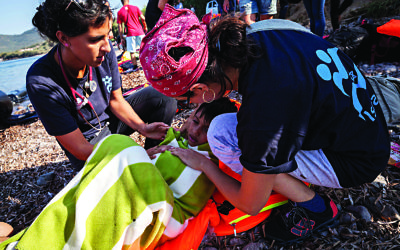
In September Prime Minister Benyamin Netanyahu spoke out in support of a plan to make all of the country’s 30, 000 African refugees and asylum-seekers, including Darfuris, leave the country.
While refugees continue to work and pay taxes in Israel, with official ID they cannot access services such as medical and health care.
“A reason for hope though is the Israeli society, and the Jewish diaspora, ” Haroon said.
“In Israel, ordinary people in society, people that work with refugees, are very supportive and they show solidarity.
“Even people who voted for some of the more right-wing parties who want to bring in measures against refugees, many of the people voting, they are supportive of refugees as well.
“From 2018, when the government began to deport the refugees from Israel, it was beautiful to see the solidarity from Israeli society. Rallies everywhere opposing deportations, and stressing our own state was built by refugees.
“That is still beautiful to see, showing empathy. As is the seeing the Jewish diaspora advocating and funding organisations and NGOs working in Israel to protect refugees.”
With more recent conflicts, such as Russia’s invasion of Ukraine, and Israel’s response to the Hamas atrocity now dominating news headlines, Haroon is at pains to point out that the atrocities in Darfur continue almost unnoticed.
More than 10, 000 people were killed in the region over the past year, with evidence that chemical weapons are now being used.
Aid workers fear the conflict, which shocked many in the Jewish world in 2008, has now left over 5 million people as refugees, alongside the hundreds of thousands who have been killed.

Thank you for helping to make Jewish News the leading source of news and opinion for the UK Jewish community. Today we're asking for your invaluable help to continue putting our community first in everything we do.
For as little as £5 a month you can help sustain the vital work we do in celebrating and standing up for Jewish life in Britain.
Jewish News holds our community together and keeps us connected. Like a synagogue, it’s where people turn to feel part of something bigger. It also proudly shows the rest of Britain the vibrancy and rich culture of modern Jewish life.
You can make a quick and easy one-off or monthly contribution of £5, £10, £20 or any other sum you’re comfortable with.
100% of your donation will help us continue celebrating our community, in all its dynamic diversity...
Engaging
Being a community platform means so much more than producing a newspaper and website. One of our proudest roles is media partnering with our invaluable charities to amplify the outstanding work they do to help us all.
Celebrating
There’s no shortage of oys in the world but Jewish News takes every opportunity to celebrate the joys too, through projects like Night of Heroes, 40 Under 40 and other compelling countdowns that make the community kvell with pride.
Pioneering
In the first collaboration between media outlets from different faiths, Jewish News worked with British Muslim TV and Church Times to produce a list of young activists leading the way on interfaith understanding.
Campaigning
Royal Mail issued a stamp honouring Holocaust hero Sir Nicholas Winton after a Jewish News campaign attracted more than 100,000 backers. Jewish Newsalso produces special editions of the paper highlighting pressing issues including mental health and Holocaust remembrance.
Easy access
In an age when news is readily accessible, Jewish News provides high-quality content free online and offline, removing any financial barriers to connecting people.
Voice of our community to wider society
The Jewish News team regularly appears on TV, radio and on the pages of the national press to comment on stories about the Jewish community. Easy access to the paper on the streets of London also means Jewish News provides an invaluable window into the community for the country at large.
We hope you agree all this is worth preserving.


